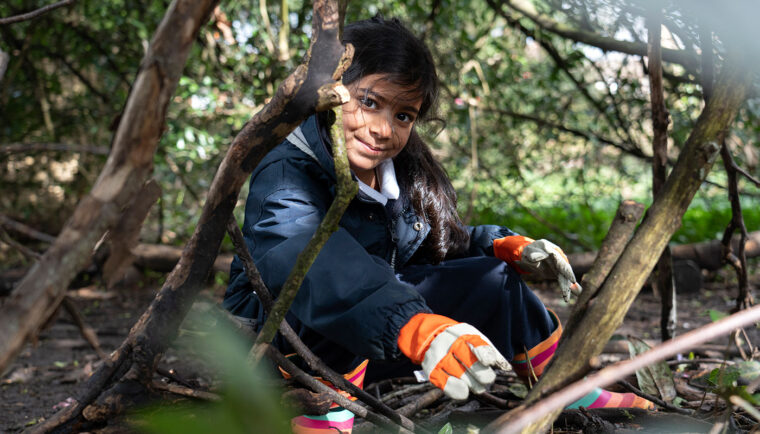News & Events
5 Mental Health Tips for Now and Beyond
March 22, 2024

Protecting our wellbeing and cultivating positive mental health is less challenging than people may think, with simple activities that can be incorporated into daily life we can all start to build the resilience we need to manage life’s pressures. Trying new things can sometimes feel uncomfortable, but we also know the more we practise them, the easier they become. Why not give them a try this half-term and see which one suits you best?
1. Get closer to nature
Nature can have a calming effect on the body, helping people to feel more hopeful and less alone. In Japan, people use “forest bathing”, known as ‘Shinrin Yoku’. The simple method of being calm and quiet amongst the trees, observing nature around you whilst breathing deeply can help both adults and children de-stress and boost health and wellbeing in a natural way. The idea is to get connected with your natural surroundings.
Croydon High is surrounded by greenery with a beautiful tree-lined field, the perfect set-up for going on short walks at break time or lunch, or even sitting on a bench and just simply being still and present.
Through weekly lessons or as part of Nature Club, the Junior School Forest School provides pupils with the opportunity to explore outdoor learning through all seasons. Not only does Forest School enable the pupils to connect with nature, but also gets them thinking about sustainability and the future of green spaces, and its surroundings.
2. Move your body
Our bodies and minds are interdependent, and looking after ourselves physically also helps us prevent problems with our mental health. Moving our bodies whether this be through sport, gardening, dancing, cycling, walking the dog, cleaning or going to the gym, are all great ways to improve our mental and physical health.
Exercise releases “feel good” hormones that reduce feelings of stress and anger, help us feel better about our bodies and even improve our sleep. If it involves other people, like being part of a team, a class or a group we see regularly, that can also boost our mental health.
Sport is a huge part of life at Croydon High – ranging from badminton to water polo, the pupils get to experience a variety of sports, keeping them fit and active throughout their time in school.
Pupils can also get involved with the ever-growing gardening club in the Junior School, which has now been introduced as part of the Senior School co-curricular. This is a brilliant way to not only move your body but also get closer to nature.
3. Being kind & showing gratitude
Research shows that being kind is good for everyone’s mental health. Being kind can boost our mood, help us feel more capable, strengthen our connections with others and even make us cope better with stress. You could try small but meaningful acts of kindness, such as offering a smile or a few kind words to another person. Friendly connections with others are vital for our mental health.
Practising gratitude is a way for people to appreciate what they have, instead of always reaching for something new in the hope it will make them happier, or thinking they can’t feel satisfied until every physical and material need is met. Gratitude helps people refocus on what they have instead of what they lack. Try writing thank-you notes or thanking someone mentally, writing a gratitude journal or doing an A-Z of the things you are grateful for.
4. Plan things to look forward to – vorfreude
Making plans for things we enjoy can increase our sense of hope, which is important for our mental health. Our plan could be for anything from small pleasures, like a cup of tea or your favourite TV programme or dance class, to a trip with family or friends, or seeing your favourite film, sports team or singer. Whether it’s a small or a big one, the important thing is to plan it, book it in the diary and look forward to it. The German word vorfreude describes it perfectly, ‘an intense emotion that you feel for an upcoming occasion or something that you are awaiting or expecting’.
5. Talk – a problem shared is a problem halved
The simple act of talking things through with a person we trust can help and feel like a relief. Talking may also change how you see and feel about the situation in ways you find helpful. Another benefit is that talking may strengthen your relationship with the person you speak with. This will benefit both of you and make it easier for them to turn to you when they need support themselves. Try drawing your own web of connections – a “resilience network”, writing down all the names of everyone you feel you can ask for support; start with the people you are closest to and think about how many people you know, how far away do they live and how could you contact them if you needed to; then write down all the ways they help you and you can help them.
In case children struggle to articulate their resilience network they can be reminded of KOOTH and SHOUT, online and text services respectively, which are designed for teenagers and regulated by professionals.
For parents, the webinar series “Let’s All Talk Mental Health” often has good speakers and hosts a range of videos with advice. It is a subscription-based service and comes at a small cost. Alternatively, Place2Be has short videos with advice for parents on a range of issues, with a leaning towards advice for younger children.
Ms Nerys James
Head of Psychology & Sociology, Director of Pupil Wellbeing & Head of Lower Sixth
More news
Awards and Celebration
GDST Creative Writing Year 12 & 13 – highly commended
Co-curricular







